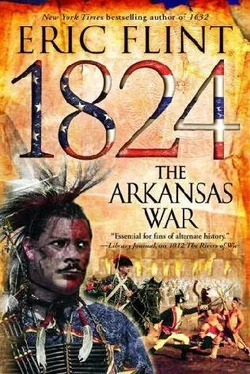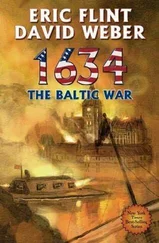Eric Flint - 1824 - The Arkansas War
Здесь есть возможность читать онлайн «Eric Flint - 1824 - The Arkansas War» весь текст электронной книги совершенно бесплатно (целиком полную версию без сокращений). В некоторых случаях можно слушать аудио, скачать через торрент в формате fb2 и присутствует краткое содержание. Жанр: Альтернативная история, на английском языке. Описание произведения, (предисловие) а так же отзывы посетителей доступны на портале библиотеки ЛибКат.
- Название:1824: The Arkansas War
- Автор:
- Жанр:
- Год:неизвестен
- ISBN:нет данных
- Рейтинг книги:3 / 5. Голосов: 1
-
Избранное:Добавить в избранное
- Отзывы:
-
Ваша оценка:
- 60
- 1
- 2
- 3
- 4
- 5
1824: The Arkansas War: краткое содержание, описание и аннотация
Предлагаем к чтению аннотацию, описание, краткое содержание или предисловие (зависит от того, что написал сам автор книги «1824: The Arkansas War»). Если вы не нашли необходимую информацию о книге — напишите в комментариях, мы постараемся отыскать её.
1824: The Arkansas War — читать онлайн бесплатно полную книгу (весь текст) целиком
Ниже представлен текст книги, разбитый по страницам. Система сохранения места последней прочитанной страницы, позволяет с удобством читать онлайн бесплатно книгу «1824: The Arkansas War», без необходимости каждый раз заново искать на чём Вы остановились. Поставьте закладку, и сможете в любой момент перейти на страницу, на которой закончили чтение.
Интервал:
Закладка:
Eric Flint
1824: The Arkansas War
PROLOGUE
The north bank of the Ohio River, near Cincinnati
By the time they had finished making camp for the night, Sheffield Parker was exhausted. They'd been pushing hard for over a week, ever since they'd reached the boat landing at Brownsville in Cabell County and started traveling across country instead of continuing down the Ohio River on a flatboat. A friendly white riverboat man had cautioned them about it. He said they'd been safe enough, passing down Virginia's western counties, since there were hardly any slaves in the area. But from there on downriver they'd have Kentucky on the south bank of the Ohio, and several slave catching parties were active on or near the river.
"We freedmen," Sheff's uncle Jem had protested.
The boatman glanced at their party, which consisted of Sheff and his mother, his sister Dinah and his uncle Jem, and twelve other people from three different families. Several of them were children of one age or another.
"Well, that's pretty obvious. You don't never see runaway slaves in parties this big. But look, folks, it just don't matter-and you got to know that much yourselves. Those slave-catchers are rounding up any black people they can lay their hands on, these days. It's been a field day for the bastards ever since the exclusion laws started getting enforced. They'll even roam into Ohio to do it. They'll grab you and haul you before a tame judge in Kentucky, and he'll bang his gavel and declare you obvious runaways, and you'll be up on the selling block before the day's over."
"We got papers-" Sheff 's mother started digging in the sack where she kept their few valuable belongings.
"Ma'am, it don't matter. " He flipped his hand, dismissing the idea. "Forget about anything you can call 'law,' down there. If you got papers, the slave-catchers will just burn them. Then it's your word against theirs-and any judge they'll be hauling you up before would rule against Jesus Christ in a heartbeat, if he was your color."
He shrugged. "It's a shame and a disgrace, but there it is. Was I you, I'd sell the flatboat and start moving overland. Stay away from the river, as much as you can. Course, that ain't so easy, lots of places. Just be careful, is all."
They'd taken his advice, eventually, after finding someone who was willing to pay them a reasonable price for the flatboat. But it had been hard going thereafter. The road along the north bank of the Ohio was a primitive thing compared with the National Road they'd been able to take as far as Wheeling after they'd fled Baltimore. Sheff had had to carry his little sister for the past two days, she'd been so worn out.
And then it all seemed to come to nothing. Less than an hour after they made camp, just at sundown, Sheff heard a noise in the woods that circled the clearing on every side except the river. A moment later, two white men emerged, with five more coming right after them. All of them had guns, to make it still worse. Two of them held muskets, and all the others had pistols. Nobody in Sheff 's party had any weapons at all, except the big knives that Jem and two of the other men carried.
"Well, lookee here, boys. Ain't this a haul?"
Sheff stared at them, petrified, from where he was squatting by the fire. He was sixteen years old. The first eleven years of his life had been the cramped years of a poor freedman's son in Baltimore, but not really so bad as all that. Then the white people started getting crazy after some sort of battle near New Orleans that Sheff didn't understand much about, except it seemed some black men had beaten the state militia over there and moved to the new Confederacy of the Arkansas. Which was way out west; Sheff wasn't really sure exactly where.
White people had gotten mean, thereafter, a lot meaner than usual. New laws had been passed in Maryland, ordering all freedmen to leave the state within a year. Like most freedmen, they'd just ignored the law, seeing as how they were poor and didn't know where to go anyway. Most states were passing the same laws. Freedman exclusion laws, they were called. Then the rioting had started, and they hadn't had any choice but to try to make it to the Confederacy.
And now, even that was going to be denied them.
One of the white men with a musket hefted it up a few inches. Not cocking it, just making the threat obvious. "Don't be giving us no trouble, now. I don't want to kill no nigger, on account of it's a waste of money. But I will. Don't think I won't."
One of the other men chuckled and started to say something. But he broke off after the first couple of words, startled by movement to his left.
Sheff was startled, too. He looked over to the far side of the clearing and saw that another white man had come out of the woods.
He hissed in a breath. That was the scariest-looking white man Sheffield Parker had ever seen. And, even at the age of sixteen, he'd seen a lot of scary white men. Especially over the past few months, since the killing had started.
"And who're you?" one of the white men demanded of the new arrival.
The man who'd come out of the woods ignored the question. His eyes simply moved slowly across the clearing, taking in everything. He was holding a musket in his right hand, almost casually.
The sun had set by now, and in the flickering light of the campfire, those eyes looked very dark. But Sheff was pretty sure they were actually light colored. That scary bluish gray color that he'd come to fear and hate more than any color in the world. The color of the eyes of most of the men who had beaten his father to death just a few weeks earlier. Sheff hadn't had any trouble, then, determining the color. The men had done the deed in broad daylight, on a street in Baltimore.
He'd thought they were going to kill him, too, but they'd satisfied themselves with just beating him and his mother. Following which, they'd given them two days to get out of Baltimore, or suffer his father's fate.
They'd left that very night, instead, along with a dozen other survivors from the race riot the white men had launched.
"Who're you?" the white man demanded again. He began to raise his musket.
"Bring that gun an inch higher and you're a dead man," the newcomer said. Turning his head, slightly: "See to it, Salmon. Levi, if any of the others makes a threatening move, kill him."
The seven original white men froze. Partly, Sheff thought, that was because of the sight of two musket barrels emerging from the woods, gleaming in the campfire light. But mostly it was just the way the man had said the words.
Scary, that had been, like everything about him. The words had issued from those gaunt jaws like decrees from a judge-or maybe one of those Old Testament prophets that Sheff 's uncle Jem was so partial to. For all the threat in the words, they'd been spoken neither casually nor in heat. Simply:
Stated. The way a man might state that the sky was blue, or that the moon rose. A certainty, a given, decreed and ordained by nature.
One of the other seven white men finally broke the paralysis. He hunched his shoulders and spit. "Well, tarnation, sir, who are you?"
In a more aggrieved tone, one of the others added: "It ain't fair! We spotted and tracked 'em first. Rightfully, the reward should be ours."
The gaunt-jawed man brought his gaze to bear on that one. "What 'reward'?"
"Well:"The other seemed a bit abashed, for a moment. "The reward for capturing runaway slaves, of course."
That finally brought Sheff 's mother out of her own paralysis that she'd fallen into the moment the first seven white men had come into their camp. "Tha'ss not true! We freedmen! We was driven out of Baltimore, and we on our way to the Confederates in Arkansas."
Читать дальшеИнтервал:
Закладка:
Похожие книги на «1824: The Arkansas War»
Представляем Вашему вниманию похожие книги на «1824: The Arkansas War» списком для выбора. Мы отобрали схожую по названию и смыслу литературу в надежде предоставить читателям больше вариантов отыскать новые, интересные, ещё непрочитанные произведения.
Обсуждение, отзывы о книге «1824: The Arkansas War» и просто собственные мнения читателей. Оставьте ваши комментарии, напишите, что Вы думаете о произведении, его смысле или главных героях. Укажите что конкретно понравилось, а что нет, и почему Вы так считаете.











